Key takeaways:
- Effective logistics planning is essential for successful film production, involving resource management, communication, and scheduling.
- Flexibility and adaptability are crucial during unexpected challenges, emphasizing the need for contingency plans.
- Clear communication and nurturing relationships within the team and external contacts are vital to overcoming production obstacles.
- Maintaining detailed checklists and regular updates helps prevent oversights and fosters a collaborative environment among crew members.
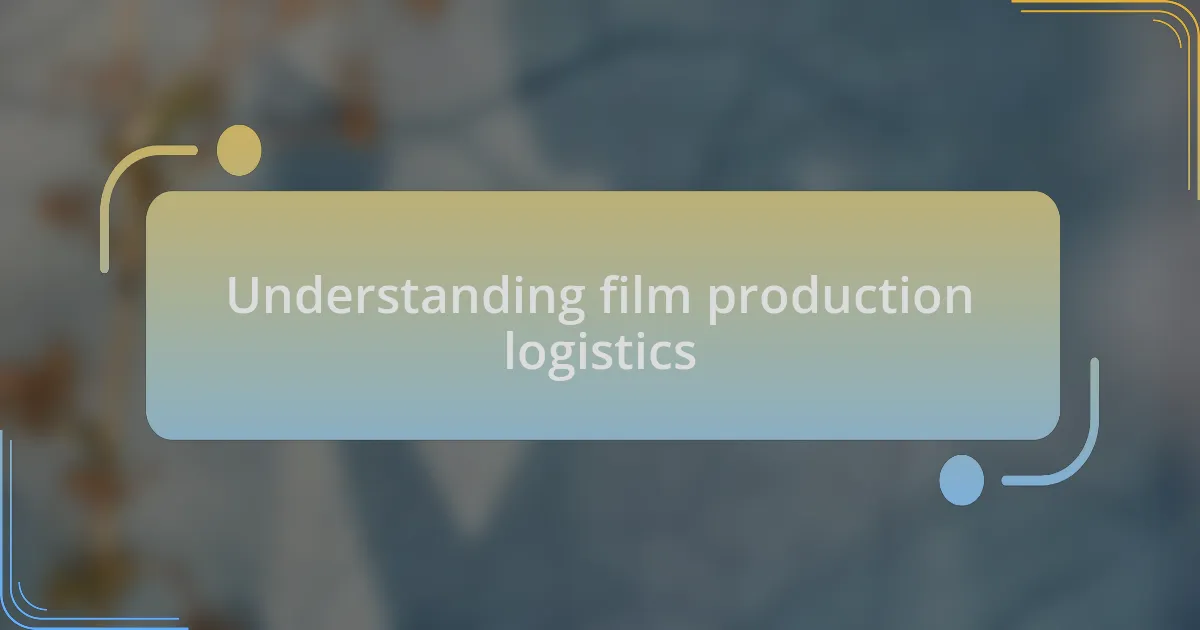
Understanding film production logistics
Understanding film production logistics is crucial for any successful project. I remember my first experience on set, and I was struck by how much work went into organizing everything behind the scenes. From securing locations to managing the schedule, logistics can often feel like a puzzle that needs to fit perfectly.
When I think about the various elements of logistics, it’s astounding how interconnected they all are. I once faced a situation where a last-minute location change required us to rethink the entire shooting schedule. It was a real test of our adaptability and collaboration as a team. Have you ever found yourself in a similar situation where everything seemed to depend on that one decision?
The planning stages of production are about more than just timelines; they’re about anticipating problems and devising creative solutions. I’ve learned that having contingency plans can make all the difference, especially when unexpected challenges arise. It’s those moments that truly test your ability to think on your feet and keep the team motivated. How do you manage stress during unpredictable times in production? For me, staying organized and keeping an open line of communication with the crew has always been a guiding principle.
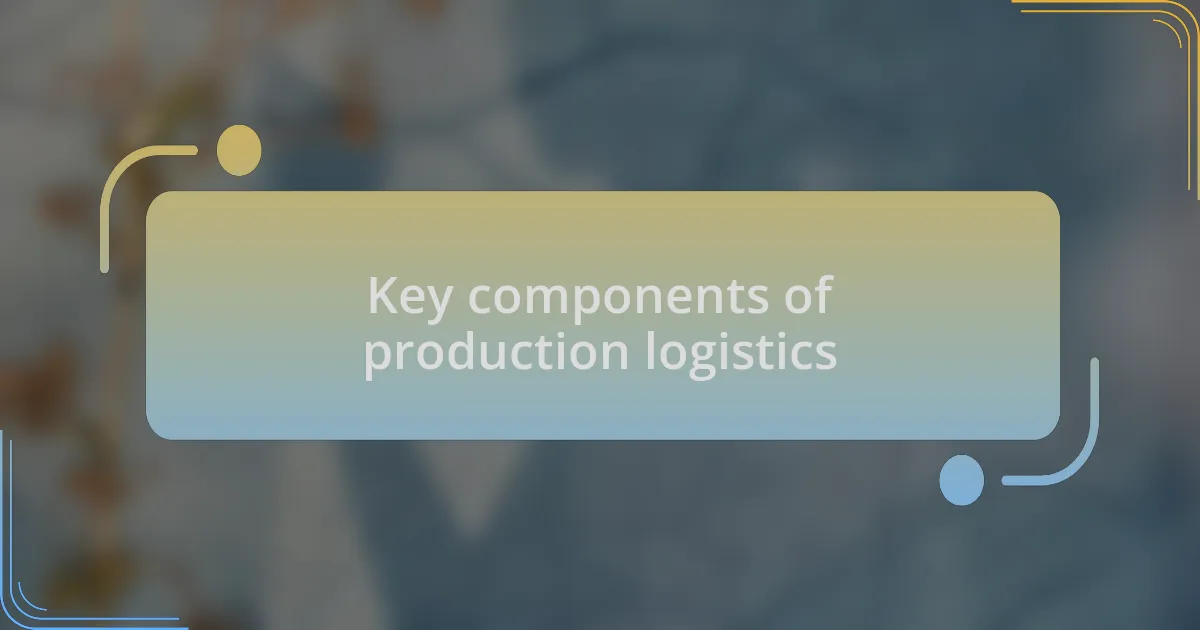
Key components of production logistics
When I dive into the key components of production logistics, one aspect that always stands out is resource management. I recall a shoot where we had a limited budget, and every dollar counted. Balancing equipment rental, crew salaries, and location fees required meticulous planning. It’s essential to prioritize what’s necessary versus what’s nice to have—how would you approach spending when resources are tight?
Another critical element is communication among the team. I’ll never forget the time when a miscommunication led to two departments arriving at a location at the same time, thinking they had the set reserved. It was chaos for a bit, but it reinforced the importance of clear channels and regular updates—why is it that even the best-laid plans can falter without good communication?
Scheduling is also central to production logistics. I can vividly remember the challenge of coordinating multiple actors’ schedules for a single scene. It felt like solving a Rubik’s cube, but once we cracked it, the satisfaction was immense. How do you ensure everyone’s availability while keeping the production on track? I’ve found that sometimes flexibility allows for the best moments to unfold.
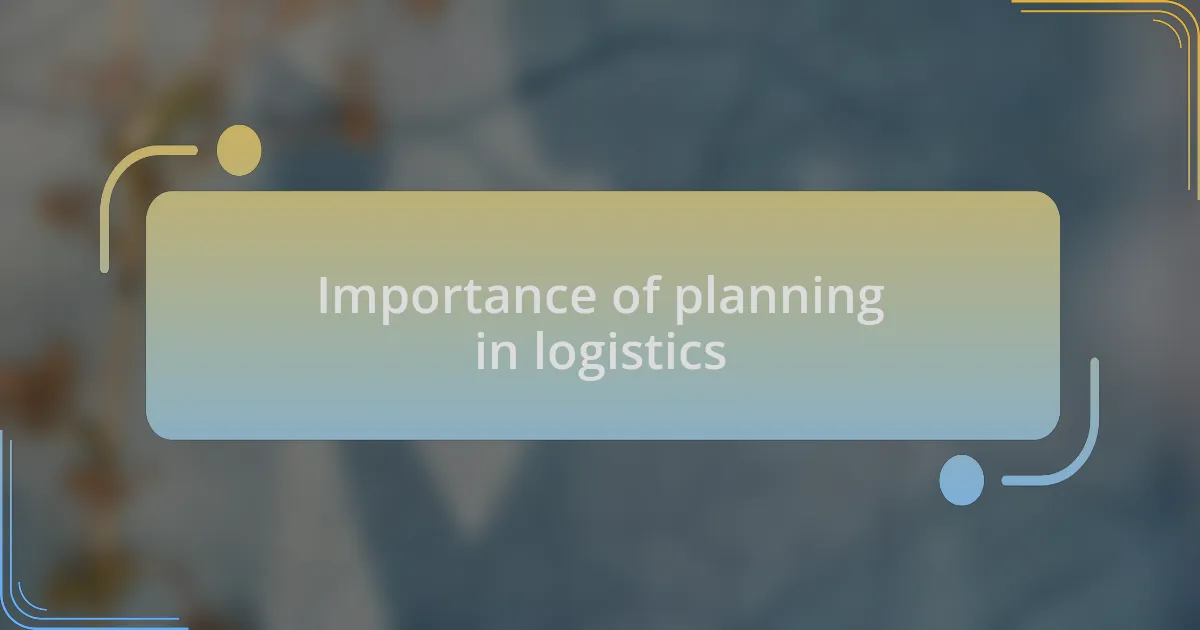
Importance of planning in logistics
Planning is the backbone of logistics in film production. I remember working on a feature film where we had a strict timeline to adhere to. The detailed schedule I created became our lifeline—it allowed us to foresee potential delays and address them proactively. Have you ever been in a situation where a lack of planning led to last-minute chaos? I have, and it reinforced how essential it is to anticipate needs and create contingency plans.
When I look back on past projects, it’s clear that effective planning directly impacts the overall success of the shoot. One time, I meticulously plotted out equipment transport logistics, which saved us hours on set. The sense of accomplishment when everything arrived exactly on time was invigorating. It makes me wonder—how many productions have suffered because logistics were an afterthought?
I find that planning goes beyond just scheduling; it fosters a sense of unity within the team. In one production, I encouraged crew members to voice their thoughts on the logistics plan during a pre-production meeting. The resulting discussions not only unearthed potential issues but also built camaraderie. Doesn’t it feel good to know that everyone is invested in the production’s success? For me, a well-planned logistics framework cultivates collaboration and enthusiasm, making the whole experience more rewarding.
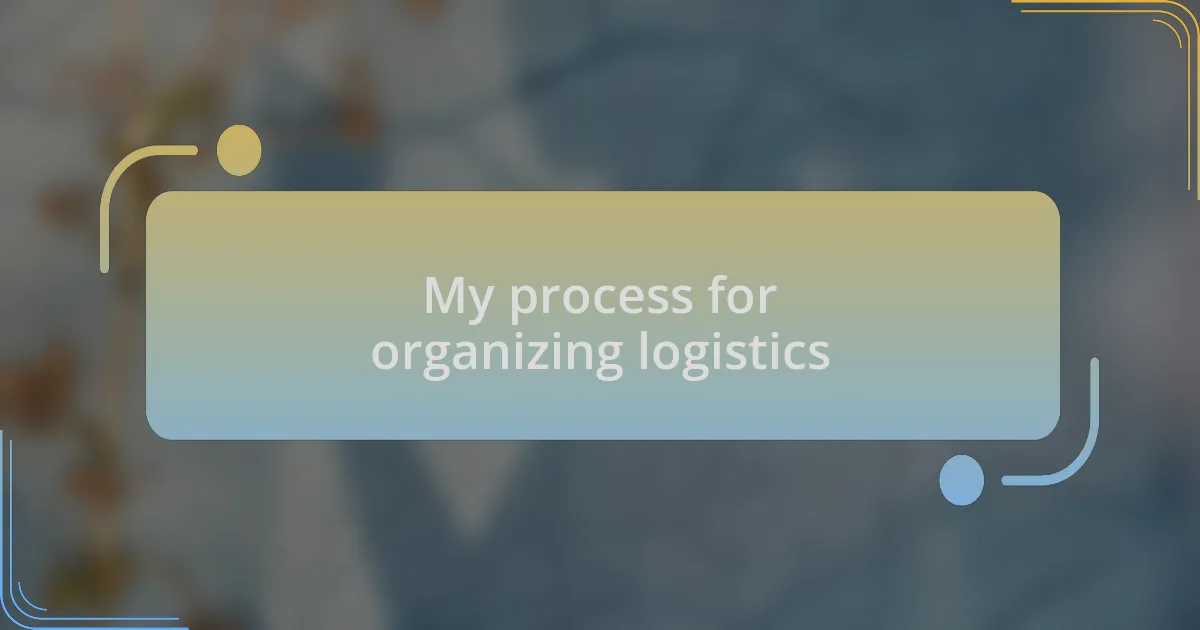
My process for organizing logistics
One of the first steps I take in organizing logistics is creating a detailed checklist tailored to the specific needs of the production. I remember one shoot where this checklist became a lifesaver; we were filming in several locations, and without it, I could have easily overlooked critical items like permits or insurance documents. How often do we underestimate the importance of such details? In my experience, having everything listed out helps me stay grounded and focused.
Next, I prioritize communication with every department involved. During a recent project, I held daily briefings to ensure everyone was on the same page. This transparent dialogue not only reduced misunderstandings but also fostered a team mentality. Have you ever seen a crew come together in this way? The energy in those meetings often sparked creative discussions, which enhanced our overall execution.
Finally, I always build in buffer time and be prepared for the unexpected. Take, for instance, a day when we faced an unexpected weather change; because I had planned for contingencies, we smoothly adjusted our shooting schedule without panic. I’ve learned that flexibility is key—after all, in film production, surprises are part of the adventure, right? Embracing that mindset not only alleviates stress but also allows for spontaneous creativity to flourish.
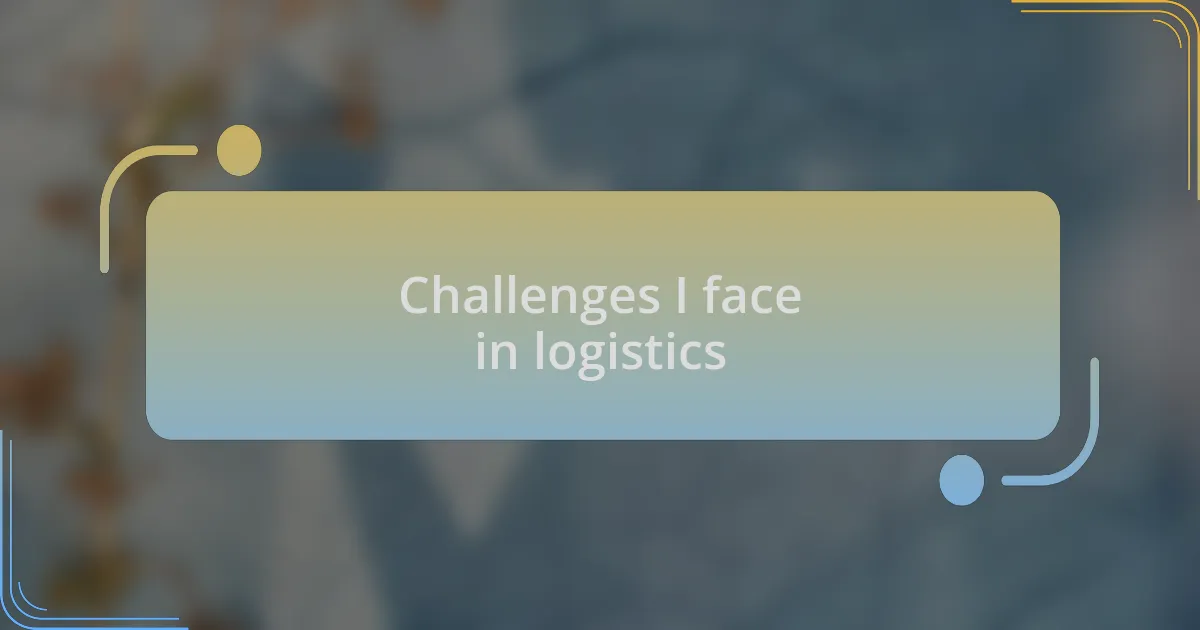
Challenges I face in logistics
One of the main challenges I face in logistics is coordinating schedules across various departments. I once had a situation where the camera crew and actors were scheduled in different locations, causing significant delays. It made me realize how crucial it is to have a centralized schedule accessible to everyone involved. Have you ever felt the frustration of miscommunication?
Another significant hurdle is managing the various needs and demands from stakeholders. On one project, I had to negotiate with local authorities for permits while simultaneously appeasing location managers and production heads. It was like juggling flaming torches! Balancing all those interests required not just organization but a lot of patience and negotiation skills. How often do we forget that not everything can be controlled?
Finally, I often struggle with unexpected costs that crop up during production. During a past shoot, we had a last-minute equipment rental that was twice the budget I had assigned. That experience taught me to always have a contingency fund and to approach budgeting with a flexibility mindset. Do you think that’s a realistic expectation in such a variable industry?

Lessons learned from my experiences
One significant lesson I learned is the importance of clear communication. I recall a time when a simple detail about the shoot location wasn’t shared with the rest of the team, and we ended up with everyone arriving at the wrong place. This mishap was more than just an inconvenience; it was a wakeup call. How many times have we assumed everyone is on the same page when they’re not?
I also discovered the value of flexibility during production. There was an instance where a key actor fell ill, and we had to scramble to adjust the shooting schedule. Instead of panicking, I learned to embrace the chaos and adapt our plans while keeping everyone informed. It made me wonder—how often do we allow ourselves the grace to pivot when things don’t go as expected?
Finally, building a dependable network has proven invaluable. One time, a last-minute supplier bailed on us, and I was able to tap into my contacts for a quick solution. This experience highlighted the importance of nurturing relationships in this industry. Don’t you think that a strong network can be your safety net when the unexpected happens?